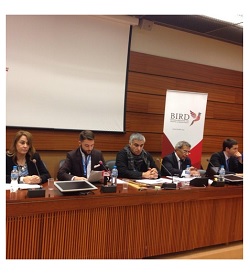18 September 2014 — Geneva, Switzerland — Americans for Democracy & Human Rights in Bahrain (ADHRB), in conjunction with 13 NGO co-sponsors, hosted an event at the 27th session of the United Nations Human Rights Council titled “Tracking Bahrain’s UPR Inaction through 2014.” Nabeel Rajab, President of the Bahrain Center for Human Rights and Co-Founder of the Gulf Center for Human Rights, moderated the discussion.
Please click here for a PDF of this summary.
James Suzano, J.D., legal officer for ADHRB, spoke about ADHRB and BIRD’s new report on the human rights mechanisms in Bahrain. Suzano stated that while the Office of the Ombudsman claims it responds to every complaint it receives, ADHRB’s experience showed a significant failure in this regard, with a response rate of less than 50%. Regarding the National Institute for Human Rights (B-NIHR), James noted that while the B-NIRH’s recent report was a move in the right direction, the government’s failure to implement the report’s recommendations indicated the creation of yet another hollow human rights mechanism created by the government.
Nidal al-Salman, Women and Children Rights Officer for the Bahrain Center for Human Rights, shed a positive light on the recent report from the B-NIHR but denounced the Bahrain government’s consistent failure to implement recommendations. “Freedom of expression is the mother of all freedoms; unfortunately, [in Bahrain] we don’t have this freedom”, noted al-Salman. “While Bahrain accepted 156 recommendations during its UPR second cycle, none of these have been fully implemented”. Al-Salman welcomed international civil society to hold Bahrain accountable for continued violations of human rights.
Said Haddadi, Middle East Researcher at Amnesty International, spoke about Amnesty’s assessment of Bahrain’s implementation of their Second Cycle UPR. He acknowledged that the Bahraini government has committed to implementing the recommendations it accepted during its 2012 UPR, but that such commitments have not been translated to action. Haddadi expressed concern over “the introduction of repressive legislation” in the two years since Bahrain’s UPR and noted that torture still regularly occurs at the CID detention facility. “The key problem in Bahrain is the lack of accountability,” Haddadi noted.
Philippe Dam, Human Rights Watch Advocate at the UN Human Rights Council, highlighted the staggering number of prisoners detained in Bahrain for their human rights. However, despite pressure from the international community in the form of four successive joint statements in the Human Rights Council, the situation in Bahrain continues to deteriorate. As such, it is time to look for stronger action to pressure the Bahraini government to reform. The international community has given many opportunities to Bahrain to avoid stronger action from the Council, yet Bahrain has not adequately addressed the human rights crisis.
Abdulnabi al-Ekri, President of the Bahrain Transparency Society, began his presentation by reminding the panel that human rights violations been documented for the past 20 years, noting a Human Rights Watch report from 1994 entitled Routine Abuses, Routine Denials. However, since 2011, “the situation in Bahrain has greatly deteriorated,” al-Ekri said. He echoed Haddadi’s sentiments that while the Bahraini government will readily accept recommendations for human rights protection, it rarely implements reform. “Bahrain uses its acceptance of reform recommendations to distract from the ongoing human rights abuses,” al-Ekri said.





